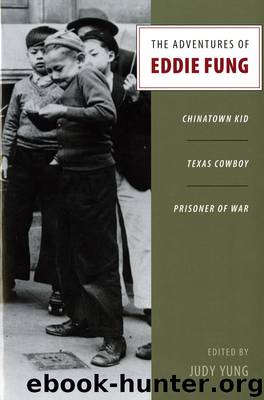The Adventures of Eddie Fung: Chinatown Kid, Texas Cowboy, Prisoner of War by Fung Eddie; Yung Judy

Author:Fung, Eddie; Yung, Judy
Language: eng
Format: epub
Publisher: University of Washington Press
Once we got underway and we could feel some air, it was a blessing. We didn’t care where we were going as long as we were moving. The rest of the trip was rather uneventful, except that more people came down with dysentery. The latrine was about three decks up, so they couldn’t make it up there in the first place, and if they did, they would have had to stand in line to use the outdoor facilities that had been rigged up for us. It was basically a “three holer” plank hung over the side of the ship. The hold was filthy beyond description. Lucky for me, I was constipated the whole time and never had to use the latrine.
MOULMEIN PRISON
When we got to Rangoon, they trans-shipped us on a barge to get to Moulmein. At that point I got scared, because I had heard stories about how the Japanese had tied a bunch of Chinese together with barbed wire, transported them out to sea on barges, and just literally dumped them overboard. I was thinking to myself, “My god, they’re putting us on barges! What’s going to happen next?” As it turned out, nothing happened. Rather, it was the most pleasant part of the trip, because we were on an open barge that had gravel on top of it, and we were allowed to lie on top of the gravel. It was fairly clean and dry, and the Japanese gave us little packets of sweet cookies and hard candy. We thought that was pretty darn good, almost like having a picnic. I couldn’t help but think of Kipling’s poem “Road to Mandalay”: “By the Moulmein pagoda, looking eastward to the sea.”
When we arrived at Moulmein prison—a real “gaol,” as the Brits called it—they put us in a large cell. We could hear prisoners being worked over— they were screaming day and night—but we weren’t subjected to any torture. We later found out we were in the leper ward. Being that Chinese and leprosy have never been on good terms, for the next ten years I sweated it out because Lois told me the incubation period was that long. The way we found out was through a sailor by the name of Donald Brain. I was amazed when I found out that he could speak Farsi, Burmese, and all kinds of languages. I said, “Donald, where did you learn to speak Burmese?” He said, “Well, before I went into the navy, my family were oil-field workers, and they worked all over Saudi Arabia and the Orient. And everywhere we went, I would pick up some street language.” Donald also found out about the railroad from the native inmates, because the Japanese were starting to round up men to help build it. That was the first time we heard there was going to be a railroad.
From Moulmein, we marched down to the railroad station to take the train to Thanbyuzayat, and there I encountered an experience of humanity that I’ll never forget.
Download
This site does not store any files on its server. We only index and link to content provided by other sites. Please contact the content providers to delete copyright contents if any and email us, we'll remove relevant links or contents immediately.
| African-American Studies | Asian American Studies |
| Disabled | Ethnic Studies |
| Hispanic American Studies | LGBT |
| Minority Studies | Native American Studies |
Cecilia; Or, Memoirs of an Heiress — Volume 1 by Fanny Burney(32064)
Cecilia; Or, Memoirs of an Heiress — Volume 3 by Fanny Burney(31460)
Cecilia; Or, Memoirs of an Heiress — Volume 2 by Fanny Burney(31410)
The Great Music City by Andrea Baker(30784)
We're Going to Need More Wine by Gabrielle Union(18637)
All the Missing Girls by Megan Miranda(14753)
Pimp by Iceberg Slim(13783)
Bombshells: Glamour Girls of a Lifetime by Sullivan Steve(13689)
Fifty Shades Freed by E L James(12918)
Talking to Strangers by Malcolm Gladwell(12883)
Norse Mythology by Gaiman Neil(12840)
For the Love of Europe by Rick Steves(11541)
Crazy Rich Asians by Kevin Kwan(8892)
Mindhunter: Inside the FBI's Elite Serial Crime Unit by John E. Douglas & Mark Olshaker(8707)
The Lost Art of Listening by Michael P. Nichols(7165)
Enlightenment Now: The Case for Reason, Science, Humanism, and Progress by Steven Pinker(6877)
The Four Agreements by Don Miguel Ruiz(6322)
Bad Blood by John Carreyrou(6281)
Weapons of Math Destruction by Cathy O'Neil(5837)
